Waste Management and Recycling in and around Kruger National Park
- Flutterby
- Posts: 44150
- Joined: Sat May 19, 2012 12:28 pm
- Country: South Africa
- Location: Gauteng, South Africa
- Contact:
Re: Waste Management and Recycling in Kruger
At the moment we have no recycling system in place in SA...all rubbish gets binned together. Supposedly Joburg is implementing a new system from July but we'll wait and see. 
- Lisbeth
- Site Admin
- Posts: 67571
- Joined: Sat May 19, 2012 12:31 pm
- Country: Switzerland
- Location: Lugano
- Contact:
Re: Waste Management and Recycling in Kruger
It will arrive sooner or later and then it all depends on people sticking to the rules 
"Education is the most powerful weapon which you can use to change the world." Nelson Mandela
The desire for equality must never exceed the demands of knowledge
The desire for equality must never exceed the demands of knowledge
- Lisbeth
- Site Admin
- Posts: 67571
- Joined: Sat May 19, 2012 12:31 pm
- Country: Switzerland
- Location: Lugano
- Contact:
Re: Waste Management and Recycling in and around Kruger National Park
Meet the villagers working with the Kruger National Park to turn waste into profit
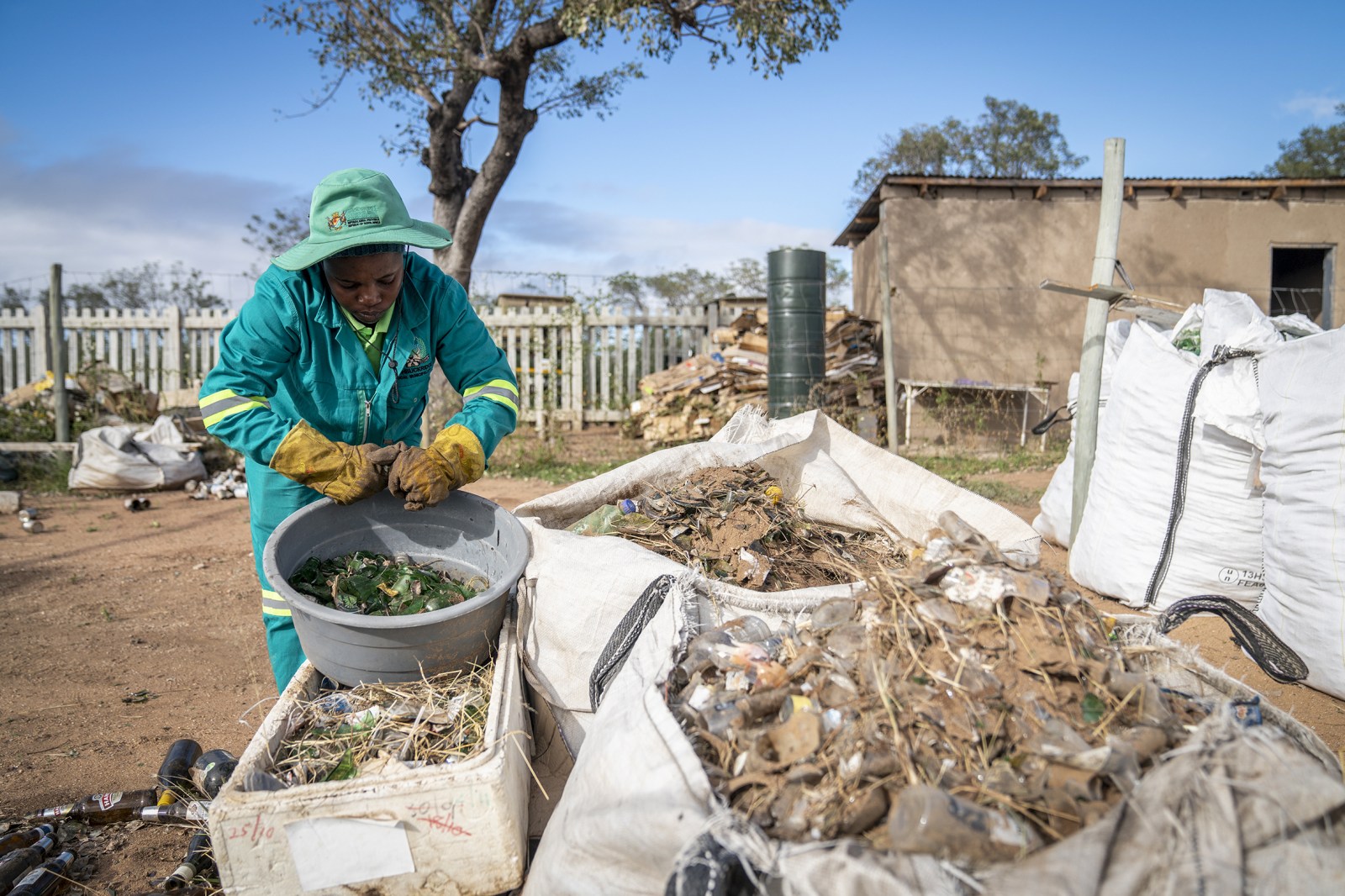
Phindile Mambane sorts glass according to its type at the Swikoxeni Waste Recycling Project, a few kilometres from the Kruger Park in Mpumalanga. (Photo: Shiraaz Mohamed)
By Shiraaz Mohamed | 05 Jul 2022
Workers are busy sorting glass, plastic, cardboard and other waste at the Swikoxeni Waste Recycling Project, several kilometres from the Kruger Park in Mpumalanga. Daily Maverick was a guest of the park to witness this collaborative effort between locals, SANParks and government and non-government entities.
___________________________________________________________________________________________________________________________
There is a huge waste challenge in the Kruger National Park because of the density of rural communities close to the western boundary. Communities are reportedly dumping excessive waste, including tins, bottles and plastic into dongas (ravines caused by water erosion) and streams close to rivers and along main roads, while some of it ends up in the park.
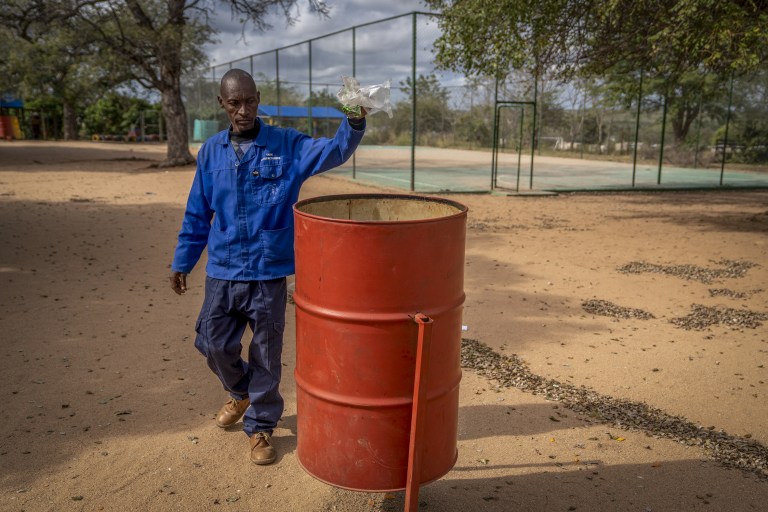
Daniel Mhaule drops litter into a bin at Babati Primary School. A partnership between the Inkomati-Usuthu Catchment Management Agency, SANParks and the local municipality has seen at least 13 schools given steel drums to use as rubbish bins. It also educates children on environmental awareness and waste management. (Photo: Shiraaz Mohamed)
Housed on 3ha between the Lillydale and Justicia villages, the Swikoxeni Waste Recycling Project was founded by Bethuel Mashele after the Kruger Park hosted an environmental awareness workshop and a clean-up campaign in 2011, with the idea that residents, SANParks officers and local municipalities would unite in the fight against illegal dumping. Waste areas were identified along main roads and in villages, and waste hotspots were pinpointed — these ranged from 2km to 2.5km apart in some villages, while others were between 500m and 1km from the Kruger fence.
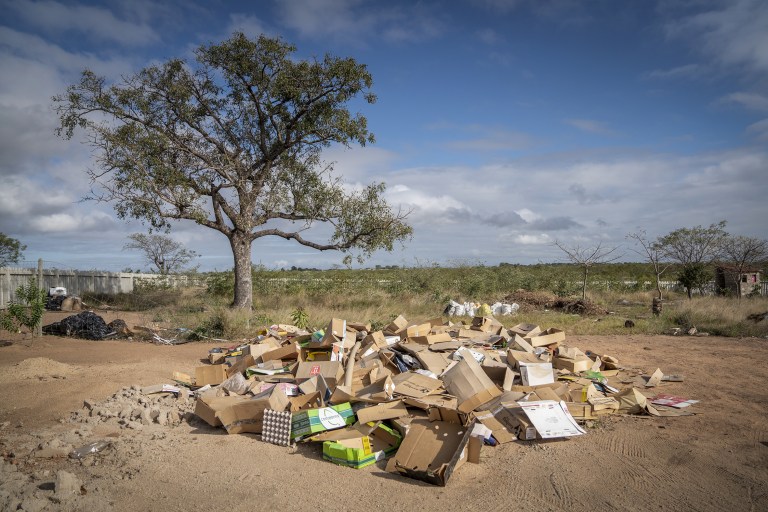
Cardboard boxes are set aside. These are used to make cardboard lamps and organic compost. Plans are underway to convert the cardboard into waste bins for school classrooms. (Photo: Shiraaz Mohamed)
The project has 20 employees, including 12 women, who are paid a stipend. While this does not make a dent in high unemployment, it does provide some reprieve.
Mashele told Daily Maverick: “Our village was so filthy. There was a study conducted by Wits University. They found out that around here there are children, some as young as five years old, who were dying because of the contaminated water that they were drinking. And there was nobody who was taking care of that waste. So we saw it fit to do something about this.”
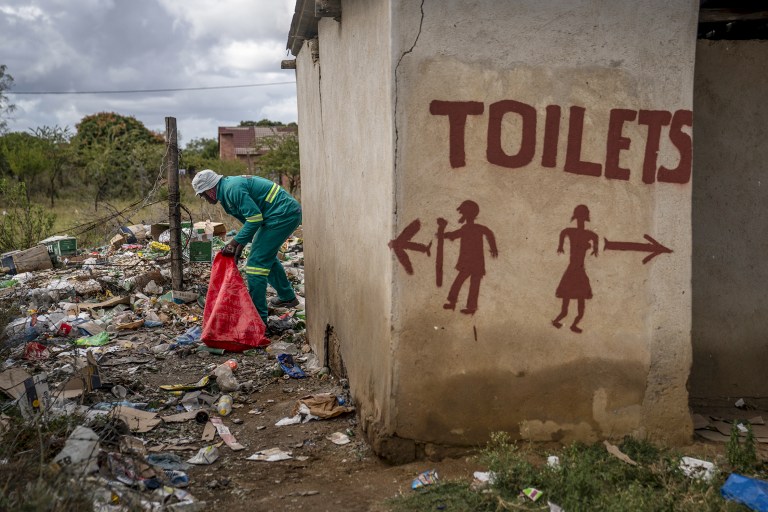
A worker collects glass bottles outside a liquor store. Shebeens and taverns are a big source of bottles. (Photo: Shiraaz Mohamed)
Workers collect glass bottles outside a liquor store. (Photo: Shiraaz Mohamed)
SANParks media specialist Isaac Phaahla said: “Waste is a big problem, littering is a big problem. But what we have seen with some of these initiatives of waste recycling and the clean-up campaigns is that it improves the quality of the water when it comes into the rivers. So it’s important for us to be part of this waste recycling project and to motivate people to do that within their surroundings.”
What started as environmental awareness outreach has resulted in a circular economy, where local people are benefiting from the project. SANParks community liaison officer Constance Khosa said: “With this facility the young people are able to get a job and put food on their tables.”
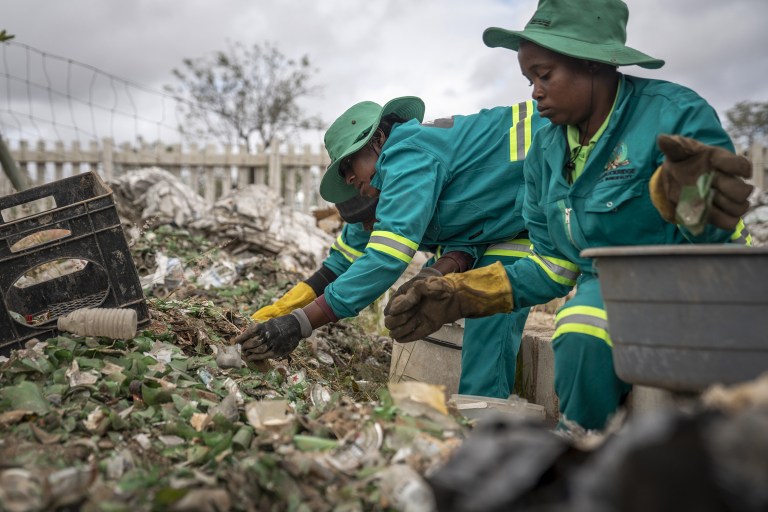
Workers sort through broken glass bottles, separating them by colour. (Photo: Shiraaz Mohamed)
SANParks encourages communities to become environmental stewards by forming start-up waste recycling projects to help curb waste while making money. Their slogan is “Yenza imali nge dodi”, which means “converting waste into dollar”.
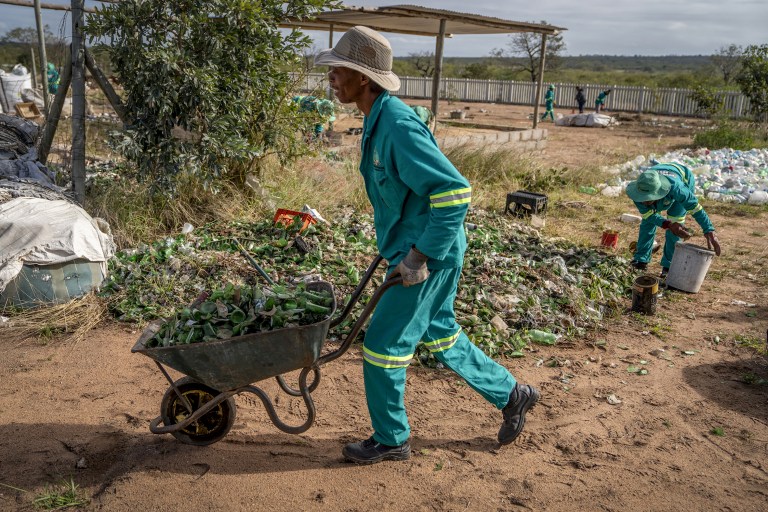
Lucky Mkhabela uses a wheelbarrow to carry bottles for crushing. (Photo: Shiraaz Mohamed)
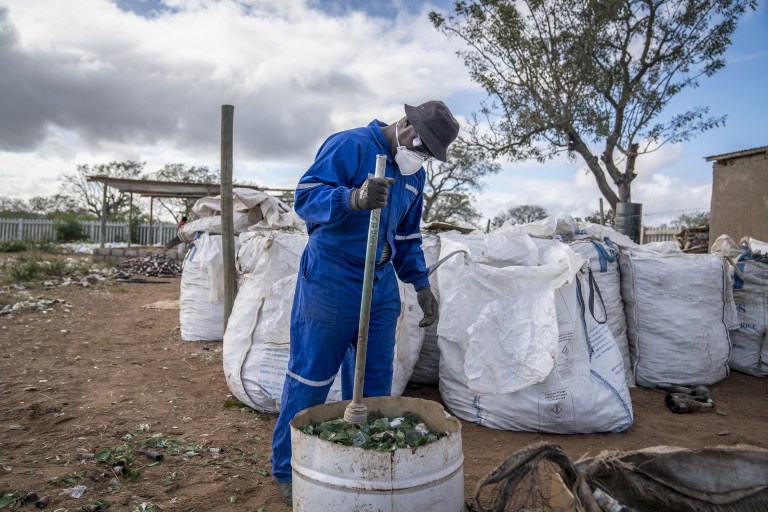
Katekani Mahori crushes bottles in a steel drum. (Photo: Shiraaz Mohamed)
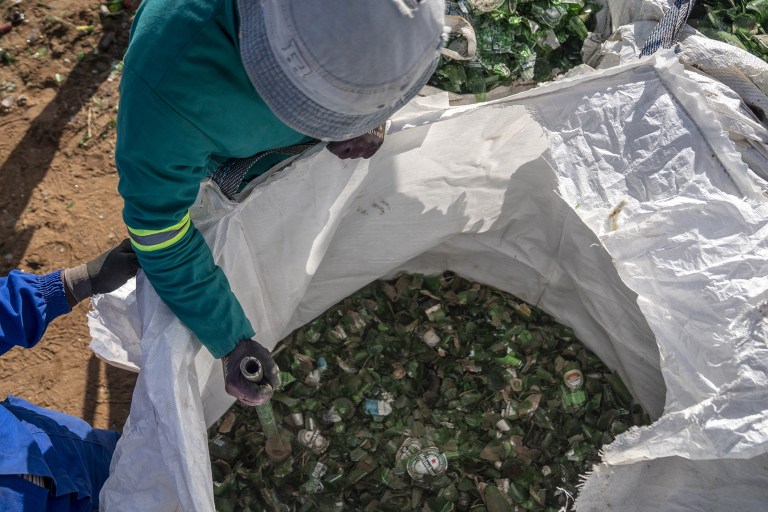
A worker manually crushes bottles. This makes it easier for storage and packaging. (Photo: Shiraaz Mohamed)
“There’s not money in waste, but billions of rands. We are not yet there, but I will be a billionaire,” laughed Mashele. “There is money in recycling as long as you have the correct resources. We transport about 60 tonnes of bottles to Gauteng each month and that brings us nearly R50,000, which helps the economy of this community.
“The sales go to salaries and maintaining this business. We don’t have a car so we hire transport — it’s money.”
Other challenges included the need for a borehole, a three-phase generator, stipends for more volunteers, resource materials and machinery.
And there are more plans for the project, including turning glass into drinking glasses and power-saving lights. They are also converting cardboard boxes into lamps and working on an initiative to convert cardboard into waste bins for classrooms. “This is why we need machinery and equipment, so that we can manufacture the end product,” Mashele said. DM/OBP

Phindile Mambane sorts glass according to its type at the Swikoxeni Waste Recycling Project, a few kilometres from the Kruger Park in Mpumalanga. (Photo: Shiraaz Mohamed)
By Shiraaz Mohamed | 05 Jul 2022
Workers are busy sorting glass, plastic, cardboard and other waste at the Swikoxeni Waste Recycling Project, several kilometres from the Kruger Park in Mpumalanga. Daily Maverick was a guest of the park to witness this collaborative effort between locals, SANParks and government and non-government entities.
___________________________________________________________________________________________________________________________
There is a huge waste challenge in the Kruger National Park because of the density of rural communities close to the western boundary. Communities are reportedly dumping excessive waste, including tins, bottles and plastic into dongas (ravines caused by water erosion) and streams close to rivers and along main roads, while some of it ends up in the park.

Daniel Mhaule drops litter into a bin at Babati Primary School. A partnership between the Inkomati-Usuthu Catchment Management Agency, SANParks and the local municipality has seen at least 13 schools given steel drums to use as rubbish bins. It also educates children on environmental awareness and waste management. (Photo: Shiraaz Mohamed)
Housed on 3ha between the Lillydale and Justicia villages, the Swikoxeni Waste Recycling Project was founded by Bethuel Mashele after the Kruger Park hosted an environmental awareness workshop and a clean-up campaign in 2011, with the idea that residents, SANParks officers and local municipalities would unite in the fight against illegal dumping. Waste areas were identified along main roads and in villages, and waste hotspots were pinpointed — these ranged from 2km to 2.5km apart in some villages, while others were between 500m and 1km from the Kruger fence.

Cardboard boxes are set aside. These are used to make cardboard lamps and organic compost. Plans are underway to convert the cardboard into waste bins for school classrooms. (Photo: Shiraaz Mohamed)
The project has 20 employees, including 12 women, who are paid a stipend. While this does not make a dent in high unemployment, it does provide some reprieve.
Mashele told Daily Maverick: “Our village was so filthy. There was a study conducted by Wits University. They found out that around here there are children, some as young as five years old, who were dying because of the contaminated water that they were drinking. And there was nobody who was taking care of that waste. So we saw it fit to do something about this.”

A worker collects glass bottles outside a liquor store. Shebeens and taverns are a big source of bottles. (Photo: Shiraaz Mohamed)
Workers collect glass bottles outside a liquor store. (Photo: Shiraaz Mohamed)
SANParks media specialist Isaac Phaahla said: “Waste is a big problem, littering is a big problem. But what we have seen with some of these initiatives of waste recycling and the clean-up campaigns is that it improves the quality of the water when it comes into the rivers. So it’s important for us to be part of this waste recycling project and to motivate people to do that within their surroundings.”
What started as environmental awareness outreach has resulted in a circular economy, where local people are benefiting from the project. SANParks community liaison officer Constance Khosa said: “With this facility the young people are able to get a job and put food on their tables.”

Workers sort through broken glass bottles, separating them by colour. (Photo: Shiraaz Mohamed)
SANParks encourages communities to become environmental stewards by forming start-up waste recycling projects to help curb waste while making money. Their slogan is “Yenza imali nge dodi”, which means “converting waste into dollar”.

Lucky Mkhabela uses a wheelbarrow to carry bottles for crushing. (Photo: Shiraaz Mohamed)

Katekani Mahori crushes bottles in a steel drum. (Photo: Shiraaz Mohamed)

A worker manually crushes bottles. This makes it easier for storage and packaging. (Photo: Shiraaz Mohamed)
“There’s not money in waste, but billions of rands. We are not yet there, but I will be a billionaire,” laughed Mashele. “There is money in recycling as long as you have the correct resources. We transport about 60 tonnes of bottles to Gauteng each month and that brings us nearly R50,000, which helps the economy of this community.
“The sales go to salaries and maintaining this business. We don’t have a car so we hire transport — it’s money.”
Other challenges included the need for a borehole, a three-phase generator, stipends for more volunteers, resource materials and machinery.
And there are more plans for the project, including turning glass into drinking glasses and power-saving lights. They are also converting cardboard boxes into lamps and working on an initiative to convert cardboard into waste bins for classrooms. “This is why we need machinery and equipment, so that we can manufacture the end product,” Mashele said. DM/OBP
"Education is the most powerful weapon which you can use to change the world." Nelson Mandela
The desire for equality must never exceed the demands of knowledge
The desire for equality must never exceed the demands of knowledge
- Richprins
- Committee Member
- Posts: 76100
- Joined: Sat May 19, 2012 3:52 pm
- Location: NELSPRUIT
- Contact:
Re: Waste Management and Recycling in and around Kruger National Park
The amount of filth and litter in the townships around Kruger is astounding!
Please check Needs Attention pre-booking: https://africawild-forum.com/viewtopic.php?f=322&t=596


